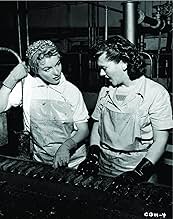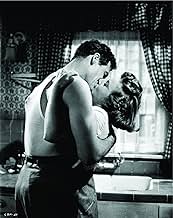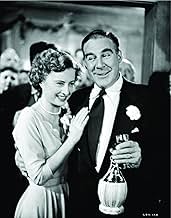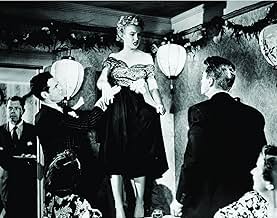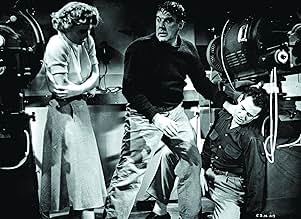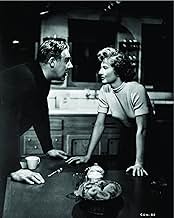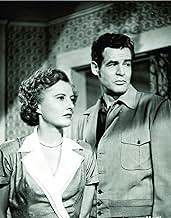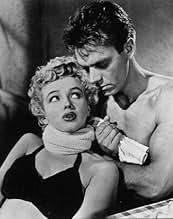IMDb रेटिंग
7.0/10
7.9 हज़ार
आपकी रेटिंग
अपनी भाषा में प्लॉट जोड़ेंMae Doyle comes back to her hometown a cynical woman. Her brother Joe fears that his love, fish cannery worker Peggy, may wind up like Mae. Mae marries Jerry and has a baby; she is happy but... सभी पढ़ेंMae Doyle comes back to her hometown a cynical woman. Her brother Joe fears that his love, fish cannery worker Peggy, may wind up like Mae. Mae marries Jerry and has a baby; she is happy but restless, drawn to Jerry's friend Earl.Mae Doyle comes back to her hometown a cynical woman. Her brother Joe fears that his love, fish cannery worker Peggy, may wind up like Mae. Mae marries Jerry and has a baby; she is happy but restless, drawn to Jerry's friend Earl.
- पुरस्कार
- कुल 3 जीत
William Bailey
- Waiter
- (बिना क्रेडिट के)
Harry Baum
- Restaurant Patron
- (बिना क्रेडिट के)
Dan Bernaducci
- Guest
- (बिना क्रेडिट के)
Albert Cavens
- Restaurant Patron
- (बिना क्रेडिट के)
Dick Cherney
- Fisherman
- (बिना क्रेडिट के)
Charles Cirillo
- Restaurant Patron
- (बिना क्रेडिट के)
Irene Crosby
- Guest
- (बिना क्रेडिट के)
Russell Custer
- Fisherman
- (बिना क्रेडिट के)
Tony Dante
- Fisherman
- (बिना क्रेडिट के)
Roy Darmour
- Man
- (बिना क्रेडिट के)
फ़ीचर्ड समीक्षाएं
A hardened woman returns home to a fishing village only to be caught between two men.
At least the movie has Andes and Monroe whose characters come across as refreshingly natural, along with revealing stock footage of the fishing industry. However, the rest of the film is pitched about ten decibels over the top, with all the subtlety of a hammer blow. Douglas's Jerry is not just a nice guy, he's a rub-your-nose-in-it Nice Guy. Similarly for Ryan's cynical Earl and Stanwyck's hard case Mae. Not even such first-rate performers as these can overcome the relentlessly overblown dialog or stagy sets. Nor does it appear the three were allowed to shade their performances beyond one-dimensional caricature. At the same time, the symbolism of roiling seas and surging tide is about as necessary as gravy on soup. In short, the movie amounts to a textbook exercise of heavy-handed histrionics and too much talk, Fritz Lang or no Fritz Lang.
I expect other reviewers are right about the material being shaped for 1950's audiences. In those days, one way of getting people away from TV was to promise them titillation since there was none on TV. But then producers faced the problem of Production Code limits on what could be shown or said on screen, especially in the way of sex. Thus, the emphasis in the film is on the atmospherics of desire instead of anything more literal. This results in a movie that, unfortunately, drowns in an overlay of heavy breathing, standard innuendo, and redundant symbolism. Such may have titillated audiences then; now there's just a dreary sameness in the repetition. At the same time, that turnaround ending shouldn't be overlooked. Unhappily, it's of the same Code-compromised sort that damaged more 50's movies than just this one.
I guess my biggest regret is how the movie takes three of Hollywood's most capable actors and reduces them to near-caricature of their usual screen persona, Douglas and Ryan, especially. Here's hoping they were at least well paid.
At least the movie has Andes and Monroe whose characters come across as refreshingly natural, along with revealing stock footage of the fishing industry. However, the rest of the film is pitched about ten decibels over the top, with all the subtlety of a hammer blow. Douglas's Jerry is not just a nice guy, he's a rub-your-nose-in-it Nice Guy. Similarly for Ryan's cynical Earl and Stanwyck's hard case Mae. Not even such first-rate performers as these can overcome the relentlessly overblown dialog or stagy sets. Nor does it appear the three were allowed to shade their performances beyond one-dimensional caricature. At the same time, the symbolism of roiling seas and surging tide is about as necessary as gravy on soup. In short, the movie amounts to a textbook exercise of heavy-handed histrionics and too much talk, Fritz Lang or no Fritz Lang.
I expect other reviewers are right about the material being shaped for 1950's audiences. In those days, one way of getting people away from TV was to promise them titillation since there was none on TV. But then producers faced the problem of Production Code limits on what could be shown or said on screen, especially in the way of sex. Thus, the emphasis in the film is on the atmospherics of desire instead of anything more literal. This results in a movie that, unfortunately, drowns in an overlay of heavy breathing, standard innuendo, and redundant symbolism. Such may have titillated audiences then; now there's just a dreary sameness in the repetition. At the same time, that turnaround ending shouldn't be overlooked. Unhappily, it's of the same Code-compromised sort that damaged more 50's movies than just this one.
I guess my biggest regret is how the movie takes three of Hollywood's most capable actors and reduces them to near-caricature of their usual screen persona, Douglas and Ryan, especially. Here's hoping they were at least well paid.
clash by night is a great example of what a difference great acting can make. those were the days! story is full of usual cliches, but stanwyck, paul douglas, robert ryan, and a young marilyn monroe: wow!!! and it shows how sexy a film can be without any "sex scenes" or even a hint of nudity.
The bitter and cynical Mae Doyle (Barbara Stanwyck) returns to the fishing village where she was raised after deceptive loves and life in New York. She meets her brother, the fisherman Joe Doyle (Keith Andes), and he lodges her in his home. Mae is courted by Jerry D'Amato (Paul Douglas), a good and naive man that owns the boat where Joe works, and he introduces his brutal friend Earl Pfeiffer (Robert Ryan), who works as theater's projectionist and is cheated by his wife. She does not like Earl and his jokes, but Jerry considers him his friend and they frequently see each other. Mae decides to accept the proposal of Jerry and they get married and one year later they have a baby girl. When the wife of Earl leaves him, he becomes depressed and Mae, who is bored with her loveless marriage, has an affair with him.
"Clash by Night" is an unpleasant drama with a bitter story and a moralist conclusion, actually a minor film of Master Fritz Lang in his career in Hollywood. Barbara Stanwyck has another magnificent performance in the role of a woman hardened by her bad sentimental and life experiences in the big city that returns home due to the lack of option. There is one quote ("When you run out of places, home is all you have left") that defines her mood. Paul Douglas plays a good honest man that nurses his old father, helps his crook alcoholic uncle and accepts the past of Mae Doyle, giving her a second chance. Robert Ryan plays a despicable rude man and disloyal friend. The affair between Mae and Earl has no chemistry and is only sexual desire. Last but not the least, it is delightful to see Marilyn Monroe playing a silly character. My vote is seven.
Title (Brazil: "Só a Mulher Peca" ("Only the Woman Sins")
"Clash by Night" is an unpleasant drama with a bitter story and a moralist conclusion, actually a minor film of Master Fritz Lang in his career in Hollywood. Barbara Stanwyck has another magnificent performance in the role of a woman hardened by her bad sentimental and life experiences in the big city that returns home due to the lack of option. There is one quote ("When you run out of places, home is all you have left") that defines her mood. Paul Douglas plays a good honest man that nurses his old father, helps his crook alcoholic uncle and accepts the past of Mae Doyle, giving her a second chance. Robert Ryan plays a despicable rude man and disloyal friend. The affair between Mae and Earl has no chemistry and is only sexual desire. Last but not the least, it is delightful to see Marilyn Monroe playing a silly character. My vote is seven.
Title (Brazil: "Só a Mulher Peca" ("Only the Woman Sins")
Why did Fritz Lang want to make this movie? Did he select the cast? "Clash by Night" was part of the recent TCM tribute to Lang, and following after the early European masterpieces, "Metropolis," and "M," one wonders how much Lang modified and compromised his early filmmaking ideals and style in resettling in Hollywood and jockey for financial support. I've not seen or read the original Odets play on which the film is based, but whatever Lang's reason for choosing it, one has to ask how the finished movie fits into Lang's output, especially the stark, powerful, stylized early pieces. A couple of features stand out: Lang always had a message-- nothing was mere observation -- that shaped the plot and characters' motivations. If Good and Evil stand out too sharply in black and white terms, Lang is still intent on sharp analysis of the turns and twists on the road to Good or Evil. Forces beyond individual characters' control are harnessed and made part of the characters motivations. Then Lang sets them on their inevitable course, and we watch, sometimes in shock or agony.
In "Clash," the imagery-- contrasting shots of sea, clouds, birds,etc, register his endorsement of the natural order of things as Good. In Metropolis, the natural order of humanity toward others was stamped out by the drive for materialism and industrial supremacy, Evil (historically predicating Nazism), symbolized always by the grinding and spouting machinery. All of the characters are tuned to a high pitch and respond with intensity. Lang's style of directing brought out the extremes -- the fortissimos-- in his actors, no matter whom he cast. Lang must have been an extraordinarily demanding director to elicit such razor-edge performances from his actors.
The fact that all the actors in "Clash" are familiar to us from other films meant Lang had to pit them against each other to an even keener degree. They are all desperate for something, whether they reveal it on the surface or not. For an actress like Stanwyck, this was an easily achieved emotional state, and she had to accept the concept of "aging" in her role. If anything, Lang forced her to keep her hard edges up a bit too much, allowing some softening only in the rather quick ending. This bit of character transformation happens only after she sees the true desperation that she's driven Paul Douglas to in the final scene in the film room.
Ah, yes, the film room. If that isn't an obvious set piece, I don't know what is. Ryan, as the third wheel, runs the projectors. Much of his dialogue is double-edged. And Ryan's character is the most desperate, the least yielding, even to Stanwyck, making his profession as a film projectionist ironic and something artificial, compared to the "natural" metier of Douglas and his father's as fishermen. They draw on the bounty of nature and so symbolize -- purposely and obviously -- pure goodness in human nature. Douglas gives a generous, sweet-tough-guy performance that is Ryan's match. Douglas never guesses what temptation he presents to his wife Stanwyck when he casually invites his best friend to stay with them. This generosity extends in particular to his overlooking faults, whether of his leeching uncle or his friend's sarcstic selfishness.
The role of the father, as a link to the Old Country and its solid gold ways is well-placed. His speech at the wedding puts his character in a nutshell: God made love, God made wine, God made friends, let everyone enjoy them, or some such pithy message. For a filmmaker like Lang, and other transplanted Europeans, the sacrifice of deep roots of their heritage and language could only be compensated for by an equally deep absorption of the customs and values of the New Country. Emigré geniuses like Lang, Wilder, or von Stroheim, never left anything behind, they reabsorbed and refashioned their material through their sharp perception of human nature in this new context. I think that is why we feel this movie to be beyond mere melodrama. I couldn't stop watching it -- the characters caught me in their predicament: they reach a universal dimension in the very simplicity and obviousness of their situations and temptations. Lang's role was to push them to that level recognition in themselves.
Even the seemingly secondary characters like Stanwyck's brother and his girlfriend, the latter played surprisingly and delightfully by a young Marilyn Monroe, give strong performances. Marilyn already shows her subtlety and emotional vulnerability. Her spontaneous response to Stanwyck's return to her brother's apartment at the beginning revealed a genuine charm, and she provided a needed sparkle in this otherwise grim film.
So why see "Clash"? Even a secondary work by a master bears his mark, and to see the mark and its features in the context of film history is still a worthwhile effort.
Of Four ****, three ***.
In "Clash," the imagery-- contrasting shots of sea, clouds, birds,etc, register his endorsement of the natural order of things as Good. In Metropolis, the natural order of humanity toward others was stamped out by the drive for materialism and industrial supremacy, Evil (historically predicating Nazism), symbolized always by the grinding and spouting machinery. All of the characters are tuned to a high pitch and respond with intensity. Lang's style of directing brought out the extremes -- the fortissimos-- in his actors, no matter whom he cast. Lang must have been an extraordinarily demanding director to elicit such razor-edge performances from his actors.
The fact that all the actors in "Clash" are familiar to us from other films meant Lang had to pit them against each other to an even keener degree. They are all desperate for something, whether they reveal it on the surface or not. For an actress like Stanwyck, this was an easily achieved emotional state, and she had to accept the concept of "aging" in her role. If anything, Lang forced her to keep her hard edges up a bit too much, allowing some softening only in the rather quick ending. This bit of character transformation happens only after she sees the true desperation that she's driven Paul Douglas to in the final scene in the film room.
Ah, yes, the film room. If that isn't an obvious set piece, I don't know what is. Ryan, as the third wheel, runs the projectors. Much of his dialogue is double-edged. And Ryan's character is the most desperate, the least yielding, even to Stanwyck, making his profession as a film projectionist ironic and something artificial, compared to the "natural" metier of Douglas and his father's as fishermen. They draw on the bounty of nature and so symbolize -- purposely and obviously -- pure goodness in human nature. Douglas gives a generous, sweet-tough-guy performance that is Ryan's match. Douglas never guesses what temptation he presents to his wife Stanwyck when he casually invites his best friend to stay with them. This generosity extends in particular to his overlooking faults, whether of his leeching uncle or his friend's sarcstic selfishness.
The role of the father, as a link to the Old Country and its solid gold ways is well-placed. His speech at the wedding puts his character in a nutshell: God made love, God made wine, God made friends, let everyone enjoy them, or some such pithy message. For a filmmaker like Lang, and other transplanted Europeans, the sacrifice of deep roots of their heritage and language could only be compensated for by an equally deep absorption of the customs and values of the New Country. Emigré geniuses like Lang, Wilder, or von Stroheim, never left anything behind, they reabsorbed and refashioned their material through their sharp perception of human nature in this new context. I think that is why we feel this movie to be beyond mere melodrama. I couldn't stop watching it -- the characters caught me in their predicament: they reach a universal dimension in the very simplicity and obviousness of their situations and temptations. Lang's role was to push them to that level recognition in themselves.
Even the seemingly secondary characters like Stanwyck's brother and his girlfriend, the latter played surprisingly and delightfully by a young Marilyn Monroe, give strong performances. Marilyn already shows her subtlety and emotional vulnerability. Her spontaneous response to Stanwyck's return to her brother's apartment at the beginning revealed a genuine charm, and she provided a needed sparkle in this otherwise grim film.
So why see "Clash"? Even a secondary work by a master bears his mark, and to see the mark and its features in the context of film history is still a worthwhile effort.
Of Four ****, three ***.
This Fritz Lang film has been largely ignored though in it's way it is as psychologically astute as many of his better known works such as "Scarlett Street". In transposing a Clifford Odets play from New York to a Californian fishing community some of the more florid dialogue seems unnaturally heightened but the performances of the three principals (Barbara Stanwyck, Robert Ryan and particularly Paul Douglas) are stunning and the emotional core of the film is so strong that an audience can feel bruised by what's on screen. The blue collar milieu is perfectly evoked, the black-and-white cinematography by Nicholas Musuraca is first-rate and even the score seems understated, adding to, rather than detracting from the dramatic effect. Essential viewing.
क्या आपको पता है
- ट्रिवियाThis movie was shot while Barbara Stanwyck was in the process of divorcing Robert Taylor. The movie also features the rising young star Marilyn Monroe. Barbara gives a good performance in one of her most memorable films. Despite her emotional devastation due to the divorce, the crew noted Stanwyck's lack of a diva tantrum. Fritz Lang later said, "She's fantastic, unbelievable, and I liked her tremendously. When Marilyn missed her lines - which she did constantly - Barbara never said a word."
- गूफ़While at the tavern, Mae and Jerry watch the moon rise over the ocean. The film takes place in Monterey, California, which is on the West coast, where the moon rises over the hills and sets on the ocean.
- क्रेज़ी क्रेडिटand introducing Keith Andes
- कनेक्शनEdited into Les Amoureux du cinéma (1987)
- साउंडट्रैकI Hear a Rhapsody
Written by George Fragos (uncredited), Jack Baker (uncredited) and Dick Gasparre (uncredited)
Sung by Tony Martin
टॉप पसंद
रेटिंग देने के लिए साइन-इन करें और वैयक्तिकृत सुझावों के लिए वॉचलिस्ट करें
- How long is Clash by Night?Alexa द्वारा संचालित
विवरण
बॉक्स ऑफ़िस
- दुनिया भर में सकल
- $62
- चलने की अवधि1 घंटा 45 मिनट
- रंग
- पक्ष अनुपात
- 1.37 : 1
इस पेज में योगदान दें
किसी बदलाव का सुझाव दें या अनुपलब्ध कॉन्टेंट जोड़ें



